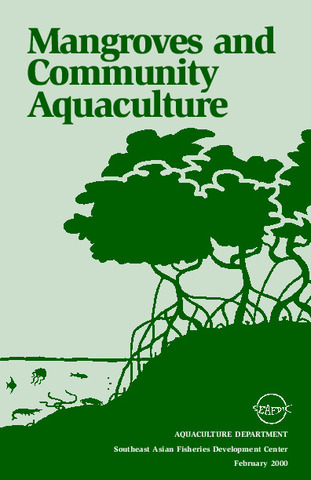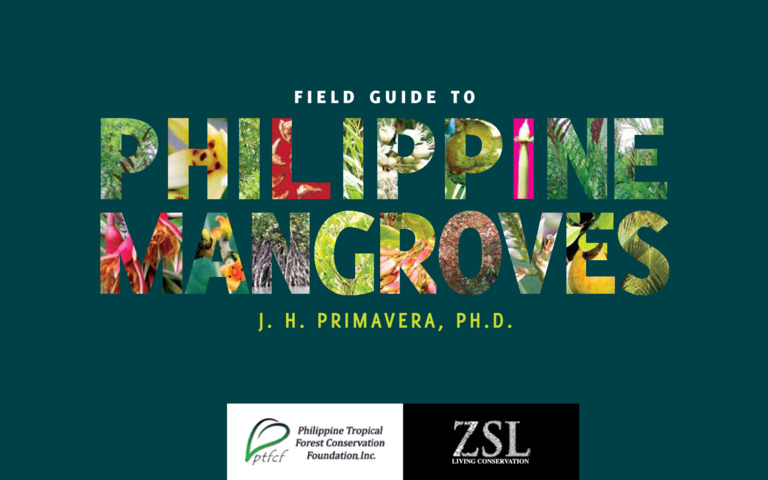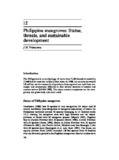Perlihatkan publikasi sederhana
Distribution pattern of shrimps and fish among Avicennia and Rhizophora microhabitats in the Pagbilao mangroves, Philippines
| dc.contributor.author | Rönnbäck, Patrik | |
| dc.contributor.author | Troell, M. | |
| dc.contributor.author | Kautsky, N. | |
| dc.contributor.author | Primavera, Jurgenne | |
| dc.date.accessioned | 2013-12-17T06:22:02Z | |
| dc.date.available | 2013-12-17T06:22:02Z | |
| dc.date.issued | 1999 | |
| dc.identifier.citation | Rönnbäck, P., Troell, M., Kautsky, N., & Primavera, J. H. (1999). Distribution pattern of shrimps and fish among Avicennia and Rhizophora microhabitats in the Pagbilao mangroves, Philippines. Estuarine, Coastal and Shelf Science, 48(2), 223-234. | en |
| dc.identifier.issn | 0272-7714 | |
| dc.identifier.uri | http://hdl.handle.net/10862/1849 | |
| dc.description.abstract | For sustainable management of mangrove ecosystems, there is a pressing need to increase our knowledge of fish and invertebrates associated with this system. This study sampled microhabitats (89–258 m2) inside the mangrove forest at Pagbilao, the Philippines, on two consecutive spring tides using stake nets. Distribution patterns of shrimps and fish were compared among four microhabitats that differed in dominant mangrove species (Avicennia marina, A. officinalis or Rhizophora apiculata), structural complexity of the root system, and proximity to open water habitat. A 5 to 6-year-old replanted Rhizophora microhabitat was also sampled to study faunal recolonization following replantation. The mean (±SE) density of the shrimp community was 1·5±0·2 shrimps m−2, dominated by Palaemonidae, followed by Acetes sp., Penaeus merguiensis and Metapenaeus ensis . The highest shrimp density was observed in the replanted Rhizophora habitat, which also had the highest structural complexity. The mean (±SE) density and biomass of the fish community was 5·1±2·0 fish m−2and 10·4±3·3 g m−2, respectively, dominated by Ambassis kopsi, A. urotaenia and Atherinomorus balabacensis. The fish community preferred the pneumatophore (Avicennia) microhabitats to the prop root (Rhizophora) habitats. Highest fish abundance and biomass were observed in the most inland habitat, which also lacked larger (total length >100 mm) carnivorous fish. The results demonstrate the extensive use of intertidal mangrove forests by vagile fauna, as well as the successful recolonization by shrimps and fish of replanted Rhizophora habitat. The role of mangroves as predation refuges, based on the distribution pattern of shrimps and fish, is discussed. Sampling strategies in mangrove intertidal habitat are also outlined. | en |
| dc.description.sponsorship | The field work of this study was supported by the Swedish International Development Cooperation Agency (SIDA). | en |
| dc.language.iso | en | en |
| dc.publisher | Elsevier | en |
| dc.subject | Atherinomorus balabacensis | en |
| dc.subject | Metapenaeus ensis | en |
| dc.subject | Palaemonidae | en |
| dc.subject | Penaeus merguiensis | en |
| dc.subject | Rhizophora apiculata | en |
| dc.subject | Philippines, Pagbilao | en |
| dc.subject | Distribution pattern | en |
| dc.subject | Penaeid shrimp | en |
| dc.subject | Root complexity | en |
| dc.subject | Predation refuge | en |
| dc.subject | Sampling strategies | en |
| dc.subject | Philippines | en |
| dc.title | Distribution pattern of shrimps and fish among Avicennia and Rhizophora microhabitats in the Pagbilao mangroves, Philippines | en |
| dc.type | Article | en |
| dc.identifier.doi | 10.1006/ecss.1998.0415 | |
| dc.citation.volume | 48 | |
| dc.citation.issue | 2 | |
| dc.citation.spage | 223 | |
| dc.citation.epage | 234 | |
| dc.citation.journalTitle | Estuarine, Coastal and Shelf Science | en |
| seafdecaqd.library.callnumber | VF SJ 0594 | |
| seafdecaqd.databank.controlnumber | 1999-31 | |
| dc.subject.asfa | biotic factors | en |
| dc.subject.asfa | ecological distribution | en |
| dc.subject.asfa | habitat selection | en |
| dc.subject.asfa | mangrove swamps | en |
| dc.subject.asfa | microhabitat | en |
| dc.subject.asfa | predators | en |
| dc.subject.asfa | protective behaviour | en |
| dc.subject.asfa | mangroves | en |
| dc.subject.asfa | fish | en |
| dc.subject.scientificName | Acetes | en |
| dc.subject.scientificName | Ambassis kopsi | en |
| dc.subject.scientificName | Ambassis urotaenia | en |
| dc.subject.scientificName | Avicennia marina | en |
| dc.subject.scientificName | Avicennia officinalis | en |
Files in this item
| Files | Size | Format | View |
|---|---|---|---|
|
There are no files associated with this item. |
|||
Publikasi ini ada di koleksi berikut
-
Journal Articles [1261]
These papers were contributed by Department staff to various national and international journals.




